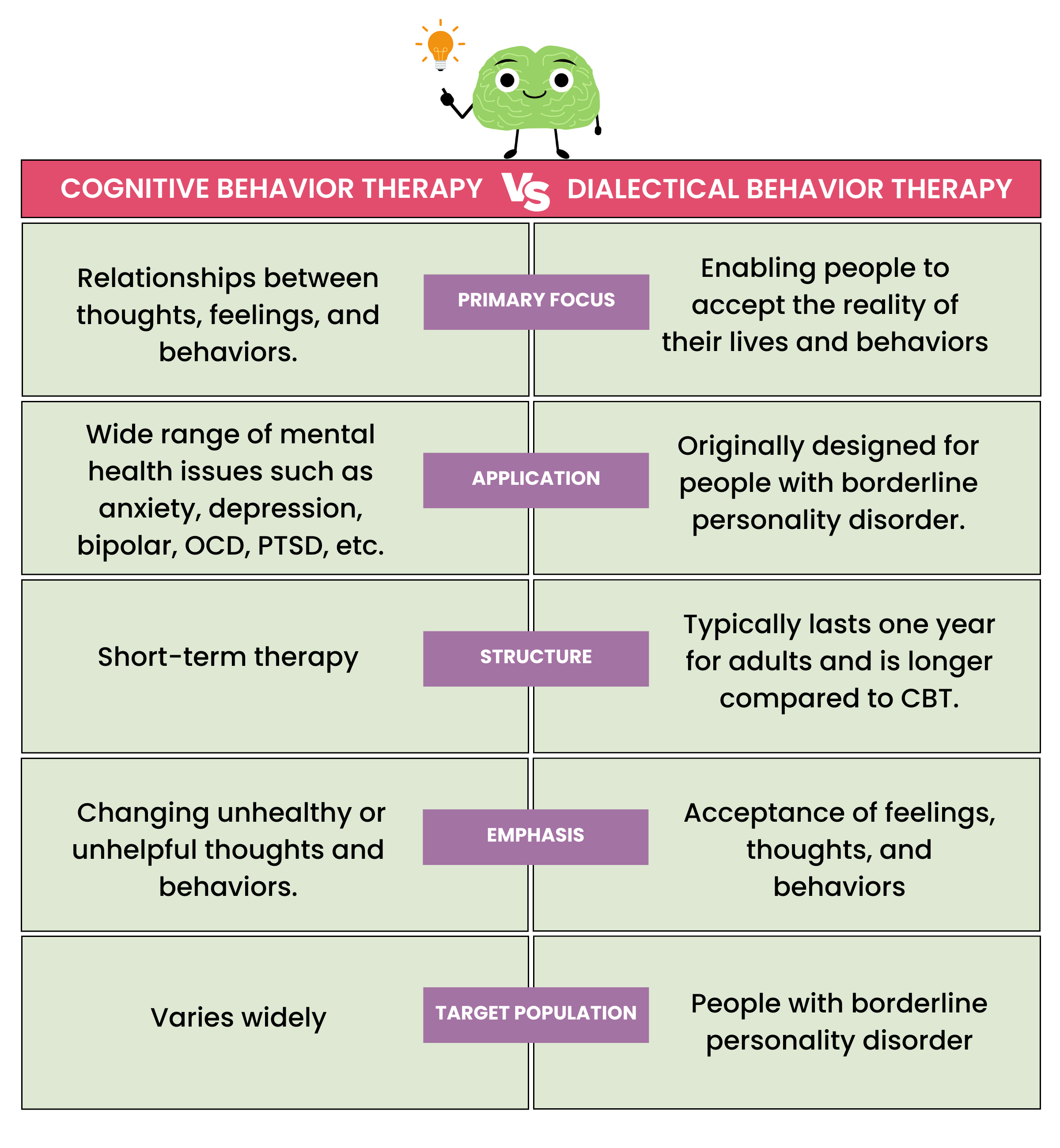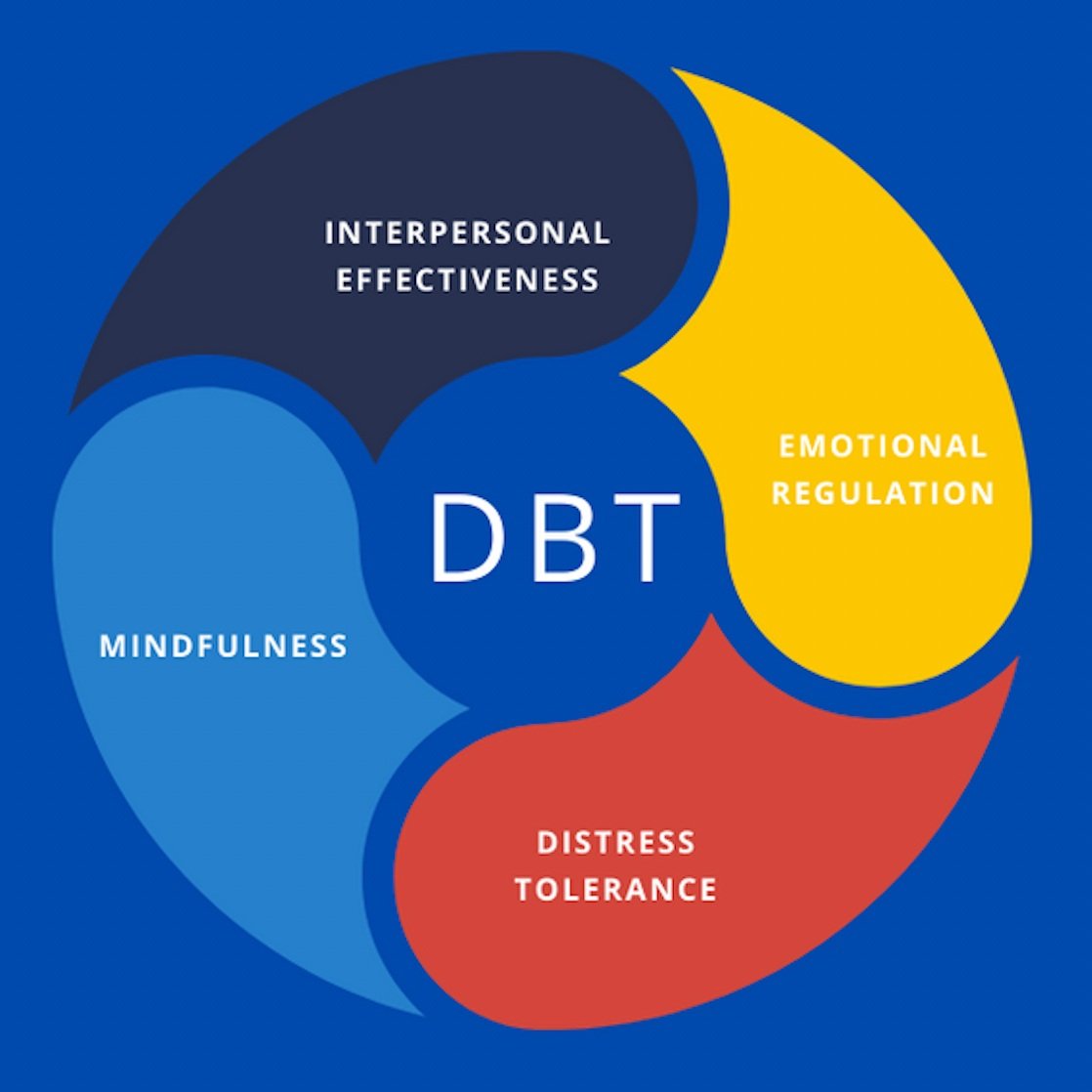Discover the Transformative Power of DBT London Therapy Sessions
Wiki Article
Empowering Individuals With Effective Dialectical Behavior Treatment (DBT) Solutions: Building Stronger Mental Health And Wellness Foundations
In the world of mental wellness and well-being, the relevance of encouraging individuals through effective Dialectical Behaviour Treatment (DBT) solutions can not be overstated. By focusing on the core principles of DBT, such as boosting emotional guideline skills, improving interpersonal efficiency, building distress tolerance methods, and growing mindfulness methods, people can get started on a journey towards structure stronger psychological health foundations.Comprehending the Core Principles of DBT


One core concept of DBT is validation. Another fundamental element is dialectics, which shows individuals to view circumstances from several perspectives and find the synthesis in between contradictory ideas or emotions.
Furthermore, the idea of dialectical abstaining is main to DBT. This principle encourages people to avoid self-destructive actions while also accepting themselves. By recognizing and including these core principles, therapists can properly carry out DBT methods and support individuals in their journey in the direction of emotional policy and mental wellness.
Enhancing Psychological Guideline Skills
Establishing proficiency in handling feelings is a basic facet of promoting emotional health and interpersonal efficiency - DBT London. Enhancing psychological law abilities is a core element of Dialectical Practices Treatment (DBT) that outfits individuals with the tools to browse extreme emotions in a constructive and healthy and balanced fashion. With DBT, people find out to determine, recognize, and manage their feelings, causing enhanced mental health outcomesDBT stresses the significance of mindfulness, which entails being present in the minute without judgment. This technique enables individuals to observe their emotions without coming to be bewildered by them, improving their capacity to react successfully instead than respond impulsively. By cultivating mindfulness, individuals can establish a better sense of self-awareness and psychological control.
Furthermore, DBT educates practical abilities such as distress tolerance and emotion policy techniques to aid individuals take care of difficult emotions. By discovering these skills, individuals can minimize spontaneous habits, improve decision-making, and strengthen their connections with others. Eventually, enhancing emotional regulation abilities via DBT empowers individuals to lead more fulfilling and balanced lives.

Improving Interpersonal Efficiency
Having actually established a solid foundation in psychological guideline skills within the structure of Dialectical Behavior Treatment (DBT), the focus now shifts towards enhancing interpersonal performance. Improving social effectiveness is an essential component of DBT as it equips individuals with the essential skills to navigate social communications, connect effectively, established limits, and develop much healthier partnerships.
In DBT, social performance abilities are educated through modules that focus on locations such as assertiveness, effective interaction, and social analytic. By learning these abilities, people can improve their capability to share their wishes and demands, maintain self-regard, and build stronger links with others.
Practicing mindfulness is an integral part of enhancing social performance within the DBT framework. Mindfulness permits individuals to be present in their communications, pay attention actively, and react thoughtfully rather than react impulsively. By integrating mindfulness into their day-to-days live, people can grow higher self-awareness and emotional regulation, which are vital for successful social interactions.
Building Distress Tolerance Methods
Discovering effective strategies for taking care of psychological distress is crucial for individuals looking for to boost their coping abilities and resilience. Structure distress tolerance techniques is a vital facet of Dialectical Practices Treatment (DBT) that equips individuals to navigate tough emotions without ending up being overwhelmed - DBT London. One basic strategy in DBT for distress tolerance is the phrase "APPROVES," which means Activities, Adding, Contrasts, Feelings, Pushing away, Ideas, and Sensations. By using these strategies, individuals can successfully deal with traumatic scenarios and control their psychological actions.Additionally, mindfulness techniques play a substantial role in structure distress resistance. Mindfulness urges people to stay present in the minute without click for source judgment, enabling them to observe their thoughts and emotions without responding impulsively. This awareness enables people to endure distress better and create a greater feeling of control over their feedbacks.
In addition to these methods, producing a tailored distress tolerance plan with the advice of a qualified therapist can give people with a customized technique to taking care of emotional distress - DBT London. By incorporating these strategies right into every day life, people can reinforce their psychological wellness foundations and improve their general well-being
:max_bytes(150000):strip_icc()/dialectical-behavior-therapy-1067402_nologo-409fbb5b4ea947bc80129bc1446170a6.png)
Cultivating Mindfulness Practices
To strengthen their distress resistance methods even more, individuals can focus on cultivating mindfulness practices as a complementary approach within the structure of Dialectical Practices Treatment (DBT) pop over to this site Mindfulness, a crucial element of DBT, involves taking note of the here and now minute without judgment. By promoting mindfulness, individuals can improve their understanding of ideas, feelings, and physical experiences, promoting a deeper understanding of themselves and their experiences.Mindfulness techniques in DBT include strategies such as mindful breathing, body scans, and observing ideas without accessory. These practices motivate individuals to establish a non-reactive position towards their internal experiences, permitting them to react to tough circumstances with greater clearness and composure. By integrating mindfulness right into day-to-day regimens, people can discover to manage their feelings better, decrease spontaneous behaviors, and cultivate a feeling of inner tranquility.
Via growing mindfulness practices, people undergoing DBT can construct a solid structure for taking care of anxiety, improving relationships, and enhancing general health. By integrating mindfulness right into their therapeutic trip, individuals can create useful skills that empower them to navigate life's obstacles with strength and self-awareness.
Conclusion
In final thought, efficient Dialectical Behavior Treatment (DBT) solutions play a crucial role in empowering individuals to build stronger mental health and wellness foundations. By recognizing the core concepts of DBT, boosting emotional regulation abilities, boosting social efficiency, developing distress resistance methods, and cultivating mindfulness techniques, individuals are outfitted with the necessary devices to navigate their emotions, partnerships, and obstacles in a more flexible and resilient manner. DBT solutions provide a comprehensive method to advertising mental well-being and empowering people to lead fulfilling lives.By concentrating on the core concepts of DBT, such as improving psychological policy abilities, enhancing social efficiency, developing distress tolerance techniques, and growing mindfulness methods, people can get started on a journey towards building stronger psychological health structures. Enhancing emotional regulation abilities is a core part of Dialectical Behaviour Therapy (DBT) that furnishes individuals with the devices to browse extreme emotions in a constructive and healthy fashion.Furthermore, DBT shows practical skills such as distress resistance and feeling guideline strategies to aid individuals handle difficult feelings.To grow their distress tolerance techniques even more, individuals can concentrate on cultivating mindfulness practices as a corresponding approach within the structure of Dialectical Behavior Therapy (DBT) By comprehending the explanation core concepts of DBT, improving emotional guideline abilities, enhancing social efficiency, constructing distress resistance strategies, and growing mindfulness techniques, people are equipped with the required tools to navigate their emotions, connections, and difficulties in a more resilient and adaptive fashion.
Report this wiki page